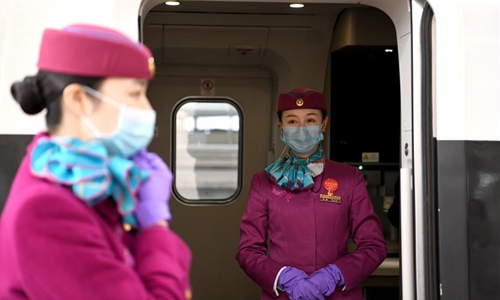HOME >> OPINION
Balance needed between economic activity, virus watch
Source:Global Times Published: 2020/2/17 21:09:30

Crew members wait for departure of a customized train at Chengdu East Railway Station in Chengdu, southwest China's Sichuan Province, Feb. 17, 2020. The customized train for returning workers left Chengdu on Monday, carrying more than 750 workers from Sichuan who are returning to work in Hangzhou, capital of Zhejiang Province, the first such train service in Sichuan. (Xinhua/Wang Xi)
There is growing public opinion on the need to speed up resumption of work in China, and some provinces and cities outside of Central China's Hubei Province have taken some actions. But there are indeed some officials and ordinary people who adopt a wait-and-see attitude. Although the number of newly diagnosed cases outside Hubei has been declining for 13 consecutive days, uncertainty still exists as the peak of population flow has not ended.
At present, it is essential that local governments make scientific decisions and shoulder responsibility. The central government also needs to give more encouragement and guidance to local governments and promote the restoration of production in areas where the epidemic has been under control.
The number of new cases in most provinces, municipalities and autonomous regions has reduced to under 10. Thus, all provinces, municipalities and autonomous regions should categorize cities and prefectures under their jurisdiction to make sure where the epidemic has faded out, where it has been controlled and where there is still a huge risk of continuous spread. And these cities and prefectures need to do the same to classify the districts and counties under their jurisdiction.
In general, we must be resolute in resuming economic activity. But the tasks of epidemic prevention and control cannot be relaxed. The combination of the two is to transform prevention and control measures from maximum ones to those based on scientific epidemiological information, and to restore production without increasing the risk of potential epidemic expansion.
In this all-out fight against epidemics, blindness and extremeness should be avoided. Local governments must trust the epidemiological analysis and judgment of the country's disease control system, and, on this basis, determine their measures. Blindly following suit and being pushed around by public opinion must be avoided.
The prefecture-level cities with no newly confirmed cases for several consecutive days should become a prominent force to drive the resumption of economic activity.
Transportation and manufacturing should be fully resumed first. Excluding Hubei Province, all temporary checkpoints for coronavirus prevention and control should be removed. No other restrictive measures except for taking temperatures are needed to allow movement of vehicles and people along traffic routes.
Businesses in services sectors that do not need or cause large-scale crowd gathering should restore operations as well. Except in certain seriously affected regions, local governments should no longer call on or even require citizens to stay indoors. Instead, guidance on how to go out safely should be strengthened. But a few services industries that may generate crowds should hold over resuming operations.
Community-level quarantines in most Chinese cities should be continued for a period of time. But the closed-off management is aimed at recording epidemiology-related information and investigating hidden dangers in the communities rather than restricting the access of people in and out of the communities.
The focus of epidemic prevention and control outside Hubei Province must be resolutely changed from a "blanket search" into a scientific epidemiological style. Local authorities in China have already established epidemiological resources, information and inspection networks in public places. This has laid the foundation for scientific prevention and control of the epidemic.
It is not scary to see newly infected individuals. The most important thing now is to find them and quickly isolate their close contacts. As long as epidemiological prevention and control work can be implemented effectively, the possibility of a whole community being isolated due to only one patient could be avoided.
The upcoming epidemic prevention and control as well as resumption of work will be a greater test for local officials to carry out relevant targeted policies. Officials should be courageous to face the possible risks in their work.
We do not believe prevention and control are no longer needed. Instead, we appeal to scientific, targeted measures while opposing excessive prevention and control. It is sincerely hoped that local authorities will take seriously the opinions of experts, take the local situation into consideration, and care more about the interests of local people rather than doing things only in a "politically correct" manner.
Newspaper headline: Economy, virus watch balance needed
Posted in: EDITORIAL